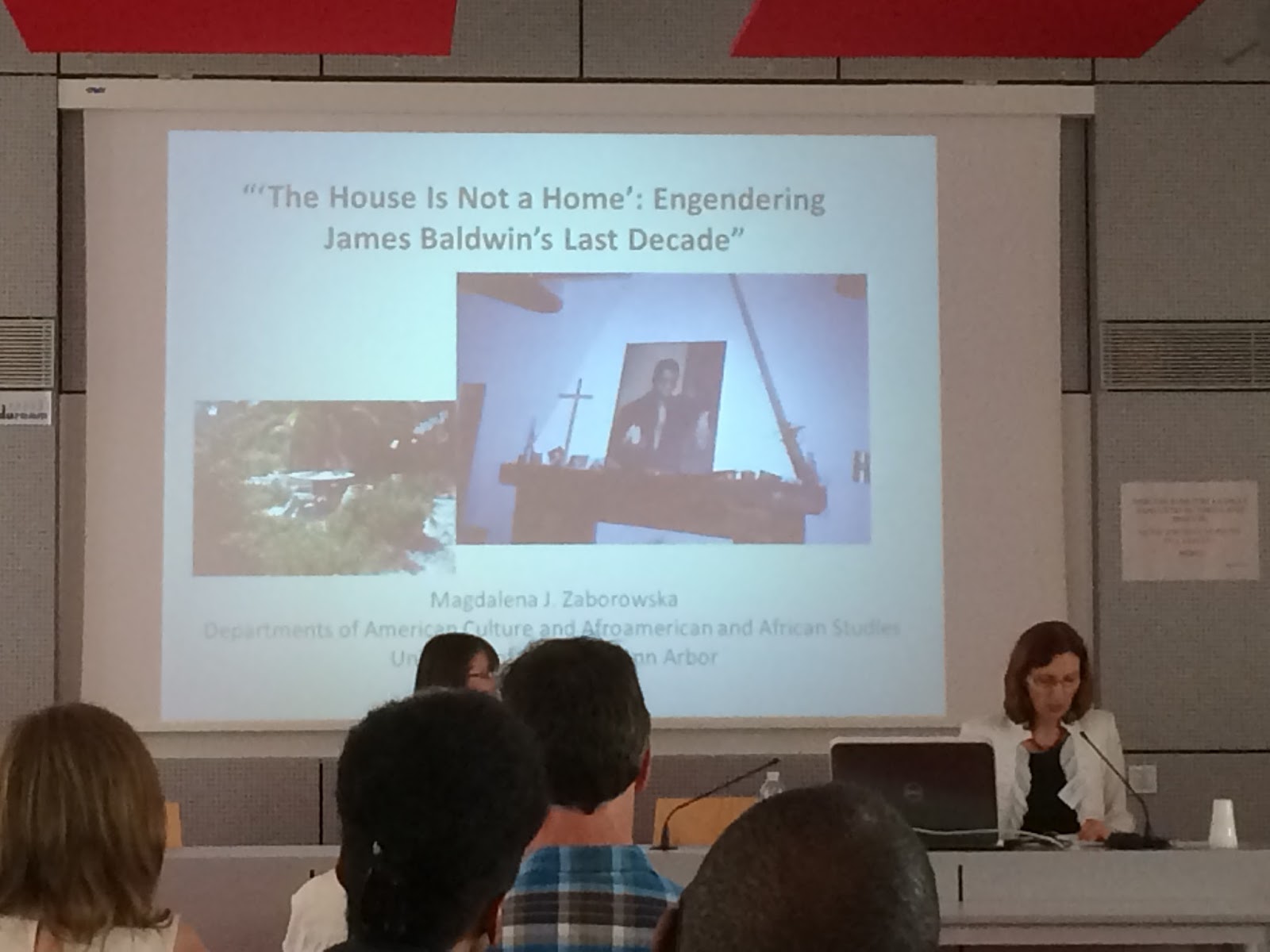The James Baldwin: Transatlantic Commuter conference is underway at the Université Paul-Valéry, Montpellier, and it has been an amazing experience thus far. Organized by D. Quentin Miller of Suffolk University and Claudine Raynaud of Université Paul-Valéry, Montpellier, the conference has brought together many of the major scholars of Baldwin's work, as well as creative writers, filmmakers, longtime friends of Baldwin, and graduate students now in the process of writing and thinking about Baldwin's life, work and legacy.
Thus far there have been several keynote talks. Yesterday David Leeming, widely considered one of the leading Baldwin scholars and his major biographer, delivered the first, offering personal anecdotes about his experiences with "Jimmy," with one highlight an extraordinary story about the time he collected painter-seer Beauford Delaney from his Paris apartment-temple, though only after lying head to head with him on cots, in a sheet-draped room, and talking about everything for five days. He then drove Delaney and another poet to Baldwin's lodgings in Istanbul, and to keep Delaney from running off (he was falling apart mentally) had to hold him in bed to keep him lying down.
Today Magdalena Zaborowska, author of the award-winning James Baldwin's Turkish Decade: Erotics of Exile (Duke, 2009), who talked about Baldwin's final home in St. Paul de Vence, France, and how we might recover from "the material the metaphorical," and "the literal the literary" new ways of thinking about Baldwin's archive. One aspect of her forthcoming project that I found particularly fascinating was her discussion of how Baldwin's interest in certain women in his life increased toward the end of his life, and in his clothing and mannerisms began to play with gender more openly. She linked these shifts to his final work, The Welcome Table, which captured both this turn and social aspects of his life, including his relationships with women friends, in his final days.
On a plenary panel yesterday author and screenwriter Cecil Brown spoke about his friendship with Baldwin from the early 1970s on, when Baldwin was being heavily surveilled by the FBI and carefully considering the terms of his exile. A number of his anecdotes centered on time he spent with Baldwin at the house in St. Paul de Vence, and on the relative rarity in those days, compared with today, of American black people in France. Some of Brown's comments veered into problematic territory and his comments today in response to a presentation again did so, but one way of looking at this was that he was giving his unvarnished truth, offensive as it might be. Jacqueline Jones Compaore, who was Baldwin's student during his stint at the western Massachusetts 5-college system, joined him on the plenary panel, talking quite movingly of Baldwin as a teacher who could terrify students by challenging their BS outright, but also showed great care for many of them and deeply inspired her.
Amidst the keynotes have been full days of panels, on all aspects of Baldwin, from discussions of music in his work to his public and private lives to a digital annotations project now underway to to his transatlanticism. My panel, on new approaches, was the first of this afternoon, and I gave an abridged (because of time) version of a paper on "queer futurity" and James Baldwin's final novel, Just Above My Head, which I think even more now having reread and thought about it carefully deserves to have much stronger cases made on its behalf. It is a novel in which nearly all of Baldwin's concerns come together--often felicitously but sometimes not--with some of his most astonishing prose, and, as David Leeming noted in his talk, it is a "experimental," often shocking work that rewards its reader in multiple ways.
The other panelist's talks, Brian Norman's on the "Cassandra effect" of Baldwin's use--the "ventriloquism" of him after his death--and Nigel Hatton's, on his work teaching Baldwin's fiction to young people in prison, and including the great writer's work in the field of narrative medicine, were excellent. Other panels have ranged widely, but in general, have provided a rich critical engagement with every aspect of James Baldwin the artist, the intellectual, the critic, the theorist, the activist, the visionary, the man. Concluding the today's session was a screening of The Price of the Ticket, with filmmaker Karen Thorsen present to discuss many aspects of her process, her contact with Baldwin, some particulars of the film, and related anecdotes. I have seen this film before, but hearing her provide background information enriched my thinking about it. There's one more day of Baldwiniana, and I'm looking forward to it and to seeing more of Montpellier!
 |
| First morning registration |
 |
| The organizers, D. Quentin Miller and Claudine Raynaud |
 |
| Dennis Tyler, who gave the first talk of the day, and D. Quentin Miller |
 |
| David Leeming |
 |
| Site St Charles, Université Paul-Valéry |
 |
| Cecil Brown and Jacqueline Jones Compaore |
 |
| Anti-fascist posters near the university |
 |
| Jezy Gray, Ed Pavlic, giving his paper, and Quentin Miller |
 |
| Magdalena Zaborowska, at right, at her keynote |
 |
| Actor and videographer Samuel Légitimus, founder of the Collectif James Baldwin |
 |
| Rasheeda Briggs, Monica Miller, and Christopher Driscoll |











No comments:
Post a Comment